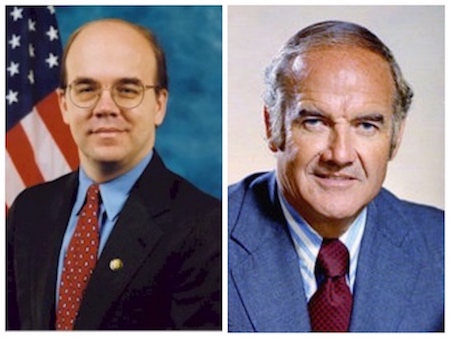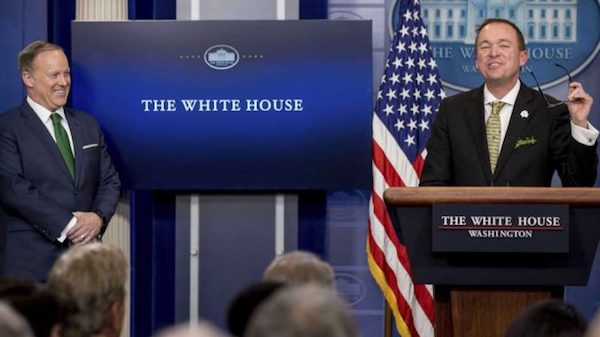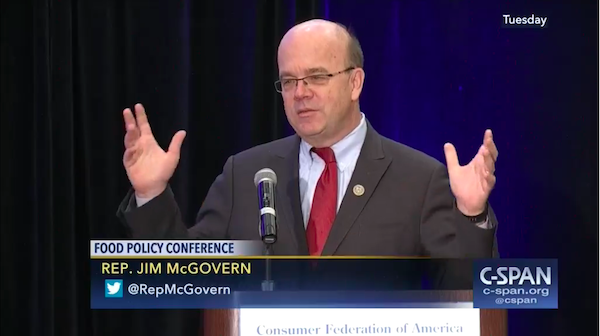American Cows are Eating Skittles and Other Reasons Why the 2018 Farm Bill is Important
John Collins

In January, a flatbed pickup truck filled with only red Skittles crashed on a highway near Beaver Dam, Wis. This prompted the Mars Corporation to issue a statement explaining that the theoretically strawberry flavored candies had been rejected at the factory for lacking an “S” (for Skittle not strawberry) and were en route to becoming cattle feed. Headlines of the spectacle briefly captured public attention. Then, cursory inquiries revealed the practice is not uncommon.
Snopes, the world’s urban legend fact checker, traced the candy-to-farm phenomenon back to 2012 — a time when federally subsidized demand for ethanol (and a bad drought in the Midwest) had caused the cost of a bushel of corn to double. Searching for more affordable alternatives, some cattle farm operators discovered that the high fructose corn syrup found in imperfect candy could pad feed, sustain livestock and save big bucks.
A CNN report at the time read:
Thrifty and resourceful farmers are tapping into the obscure market for cast-off food ingredients. Cut-rate byproducts of dubious value for human consumption seem to make fine fodder for cows. While corn goes for about $315 a ton, ice-cream sprinkles can be had for as little as $160 a ton.
Old news or not, the Skittles story made it to a National Geographic blog post in which Marilyn Noble, the American Grassfed Association’s communications director, reminded readers that “cows were meant to eat grass, not candy.”
In an incident that’s either unrelated or absolutely related depending on how you look at it, on March 10 in Howell, Mich., 7,200 gallons of concentrated Mountain Dew syrup spilled from a ruptured tank at a Pepsi bottling plant into an inadequate holding area and eventually the sewer. This caused what company spokespeople called a “huge foaming event” that overwhelmed the facility’s infrastructure. Meanwhile, state environmental personnel warned the sugary discharge would be toxic to aquatic life.
Accidents happen, but we should probably not be cultivating, ingesting or investing in them. In a certain light, these two incidents, otherwise just fleeting blurbs on a crowded newsfeed, epitomize a society (and an economy) that is simultaneously generating and tolerating a profound degree of dysfunction.
We are feeding the animals we intend to eat with one of the top candies dentists tell kids to avoid, and Pepsico (NYSE: PEP) is producing a radioactive-looking beverage in large enough quantities to cause an actual toxic spill in the state of Michigan. This is Swiftian (i.e. like a scene from Idiocracy that’s happening for real). On the other hand, minimizing food waste and responsibly using what we don’t consume — something we are failing in spectacular ways to do now — is an essential part of creating more sustainable food systems that provide greater access to healthy food and clean water, now and in the future.

In Mike Judge’s 2006 comedy classic, Idiocracy, civilization’s growing consumerism and dwindling intelligence have resulted in a planet of imbeciles. This society drinks and waters their crops (unsuccessfully) with a sports drink named “Brawndo: The Thirst Mutilator.” (Caption / Image: Gizmodo)
In the coming months, the Trump administration will begin implementing new agricultural policies. (Incidentally former Georgia governor Sonny Perdue has yet to be confirmed and the Department of Agriculture (USDA) is still without a proper boss. While this makes it harder to speculate what certain policies will look like, President Trump’s “America First” budget proposal—a relatively short document that reads a bit like the “Imperial March” sounds — offers clues.)
Perhaps the most important piece of agricultural legislation in the pipeline is the 2018 Farm Bill — an omnibus law, revisited every five years, that governs multiple aspects of our food supply, everything from crop subsidies and land management to food assistance. The current farm bill, which is set to expire this year, is 357 pages of crazy that results in endless fields of corporation-backed monocultures cranking out record yields of corn, wheat and soybeans. But for farmers, profits are down, and the little guys can’t compete. Meanwhile millions of Americans are not getting enough of the kind of food they need.
On April 7, Rep. Jim McGovern (D-Mass.), a longtime champion of anti-hunger initiatives here and abroad, delivered a keynote address at the Consumer Federation of America National Food Policy Conference — a gathering of food industry, consumer advocates and nonprofits to discuss food issues. Transcribed for print and edited for length below, McGovern says what he finds most “maddening” about food insecurity, in the United States and around the world, is that it is entirely solvable. He also makes the case that that we should view food security as tantamount to national security.

Though he is not related to the late Sen. George McGovern (D-S.D.) (right), Rep. Jim McGovern (D-Mass.) was an intern in his senate office in the 1970s and they became good friends. (Image: Google Images)
Jim McGovern on food, hunger and politics
I tell people all the time that hunger is a political condition. We have the money. We have the resources. We have the infrastructure. We have the brainpower. We have everything — but we don’t have the political will. We live in the richest country in the history of the world, and we have 42 million Americans who are hungry or food insecure in the United States of America. As a U.S. congressman, as a citizen of this country, I’m ashamed of that. I find that unacceptable. It’s unconscionable that with all of our riches in this country, with all of our know-how and all of our ingenuity, that this is the reality.
When we talk about hunger, it’s more than just about talking about people who don’t have enough to eat. There are health issues related to people who on a regular basis go without food. If you’re a child who misses meals on a regular basis and you show up in school, you’re less likely to be able to learn. You are more likely to have developmental challenges in your lifetime. If you are a pregnant mother and you can’t get the adequate nutrition, that oftentimes results in the birth of an unhealthy baby. If you are a worker who, on a regular basis, goes without food, you will be less productive in the workplace. These are avoidable costs associated with hunger. And so when we talk about it, I think we need to look not just at the immediate problem, but the impact that this has on our country.
I have had a blessed life in the sense I have never had to worry about basic necessities. I’ve always had a home. I’ve always had shelter. I’ve always had enough to eat. I’ve never been hungry. But I believe that those of us who are blessed have a special obligation to make sure that we worry about and care about those who are having challenges. I think that’s just the decent thing to do. Whether it’s in our communities or whether it’s in Congress, I think this is a matter of decency to address issues like hunger.
I get frustrated in Congress because I think this issue should not be a partisan issue, and for many years it wasn’t. George McGovern and Bob Dole worked together in a bipartisan way during the 1970s to strengthen our nutrition and anti-hunger programs. We were actually on our way to eliminating hunger in this country. Then we began to reverse some of the progress we made. Now we find this issue has become very polarizing. You are never going to find a member of congress who’s going to tell you that they are pro-hunger, but when you look at their voting records I don’t know how you could come to any other conclusion: They are chipping away at programs that provide the basic necessity of food to our children, parents and older people.
When I look at the president’s budget, we are told there may be cuts to programs like the Women’s Infants and Children (WIC) program that provides basic nutrition for pregnant mothers for their young children after they are born. If we neglect that now we will end up having to pay in other ways down the line. And again, I hate to talk about this in terms of the bottom line and dollars and cents. We should be moved to do something because it’s our moral obligation to prevent human suffering in this country, but I get the feeling sometimes that’s not enough.
When I first got elected, I got to become friends with John Kenneth Galbraith, the great economist and a great visionary. I remember him saying to me one time, “I’d ask you to go out there and comfort the afflicted, but these days that might be considered eccentric…so I’m going to ask you to go out and afflict the comfortable.” I think that’s the mode we are in now. We have to go out and afflict some of the comfortable and get them to actually start responding in ways to make progress on issues like hunger.
We have these debates in Congress and inevitably the people who need these programs get characterized as somehow lazy, or somehow undeserving: “They’re poor because they want to be poor.” But I’ve never met anybody who wants to be poor. I’ve never met anybody who wants to be hungry. And by the way, when we talk about the Supplemental Nutrition Assistance Program (SNAP), the majority of people on SNAP are children, senior citizens, and people who are disabled. Of those who can work, the majority works.
So why isn’t the question in Washington: How can it be that somebody who works is still so poor that they need to rely on SNAP to put food on the table? Why aren’t we talking about increasing wages in this country so people can actually earn a livable wage and afford to put the kind of food they want on the table? Instead the debate tends to demonize the most vulnerable people in this country. And it’s frustrating because because the perception in Washington is so different from the reality all throughout this country.
We talk about how we want people to “make better choices.” Or we want people to make “healthier” choices. Absolutely. But, by the way, we all need to make healthier choices. Not just people who are on SNAP. We have studies that show that those of us who are able to afford our own food make lousy choices, too. We need to have a better and more effective national dialogue on nutrition. I serve on the nutrition subcommittee and we’ve had a lot of hearings. During one of the last someone raised the issue: Why don’t people make better choices? Well, the reason why, and it’s very simple, is that the average SNAP benefit is about $1.40 per person per meal. I bought a Starbucks coffee on the way here and that was more than $1.40 and it was a small one. The fact of the matter is that the benefits we provide people are inadequate. What we should be talking about is making sure that our social safety net is a safety net — that it provides what people need to be able to put nutritious food on the table. We ought to be talking about increasing the benefits of SNAP, not decreasing them or putting more hurdles in place to make it more difficult for people to obtain the benefit.
In Washington we are supposed to be about helping people and lifting people up — not demonizing them and putting them down; not making lives more miserable. And yet that, in effect, is what we are doing. Right now we are talking about a new farm bill. We’ve seen the president’s budget and it goes after Meals on Wheels. That is crazy. We had Budget Director Mick Mulvaney (previously a U.S. Representative from South Carolina), saying there’s “no evidence” that links some of these new nutrition programs to better performance by students in school, or to better in outcomes in terms of a beneficiary’s health status. Well I will show him a gazilion studies that show you the benefits of good nutrition at every age and how important it is, at every age, to make sure people have access to good nutrition. Just because Mulvaney said that does not mean it’s true. I know we live in a place where alternative facts are en vogue but facts are facts, are facts, are facts. Good nutrition benefits people in a million different ways.

Budget Director Mick Mulvaney (right) and Sean Spicer discuss Trump’s budget proposal at a press conference. (Image: Sheriden Broadcasting Networks)
I would argue that good nutrition is the best health care out there. My grandmother used to say, “an apple a day keeps the doctor away.” That used to annoy me but I wish she were still alive so I could say, “you’re right.” Good nutritious food results often results in good health — it prevents us from getting diseases like diabetes, heart disease, obesity or high blood pressure. We have doctors who can write out prescriptions for very expensive pharmaceuticals, but maybe we should give them the ability to write up prescriptions for good, nutritious food, which would be a lot cheaper and, in the long run, will be of a lot more benefit to that person. Our medical schools need to focus more on nutrition.
In the last farm bill, we had Republicans in the House actually move to cut the SNAP benefits by $40 billion! We had amendments for drug testing SNAP recipients. I don’t see any amendments asking for there to be drug tests for big heads of defense contracting firms — they get more money from taxpayers then people on SNAP. Better yet, let’s drug test all members of Congress. That might explain why we are having these stupid discussions half the time.
We need to insist that when members of Congress vote to defund SNAP there’s a consequence. When I vote for gun control legislation, I get the NRA calling my office, sending me letters, visiting me in my district. I know they’re not going to vote for me. And if I vote against a tax cut for a particular industry, nine times out of ten they are sending their representatives in to see me and telling me how bad I am and that they want to support my opponent — I know there’s a consequence. But when members of Congress vote to cut SNAP by $40 billion dollars, there wasn’t a consequence. If we are going to change our priorities, that has to change. They need to feel the pain; because they are creating a lot of pain. They need to understand that if you are going to vote to make hunger worse in this country, then we are going to let your constituents know and we are going to make sure that you are held accountable at the ballot box. The one thing the Democrats and Republicans have in common in Washington is we all want to get reelected. On the issue of hunger and food security, we need to elevate this issue. There needs to be a consequence.
The other thing we need to grapple with in this upcoming farm bill, in addition to preventing any cuts from SNAP, is the issue of food waste. Forty percent of what we produce in this country, we do not eat. Oftentimes it is thrown away. I have visited supermarkets, they’re probably calling security when I show up, but I go look in the dumpsters in the back. Perfectly good food is being thrown away. There are some doing a good job of trying to recapture that food, but we need a national policy on this.
We have farmers that do not have the infrastructure or do not have the manpower or womanpower to be able to capture food that they don’t think would be salable at their local supermarkets. We’re all so finicky about our food. We have to have an apple that looks like it came out of Snow White. If there is a little bump in it, we don’t want to buy it. Oftentimes, those fruits and vegetables are discarded. Sometimes they are used for animal feed. Some places, composting. Sometimes they’re put in a landfill — which is a bad idea. Let’s see if we can recapture some of this perfectly good food for our schools, our senior centers or food banks. We need to be thinking out-of-the-box and creatively about how we put together this infrastructure to recapture the food on our farms, in our restaurants and in our supermarkets. Let’s not waste it. My grandmother also used say that if I did not eat all of my food, it was a sin! I had the fear of God put into me so I would always finish my food. But she was right in a way.
Jim McGovern on expanding the definition of national security to include food
We talk about national security all the time and Mr. Trump says his budget is a national security budget. Well let me make a suggestion: The definition of national security needs to be expanded. It needs to mean more than just the number of weapons in our nuclear arsenal. It needs to mean more than the number of military bases we have around the world. It needs to mean things like combating extreme poverty and hunger around the world. It needs to make sure every single person in the United States of America has access to good nutritious food and is not food insecure. Food ought to be viewed as a fundamental right for every human being on this planet. National security ought to mean a job, infrastructure — it ought to mean 1,000 other things to improve the quality of life for people.
This is the time that like-minded people need to come together and steer this discussion because, if not, you are going to see budgets passed that are heavy on increased military expenditures while everything else gets cut. This is a time to engage because, if not, you will see a farm bill that will talk about either block granting SNAP or more hurdles for people to jump through just to put food on their table. This is a time to engage because our child nutrition programs, our school feeding programs, our programs for the elderly — are under attack. We are even having a debate about lowering nutritional standards in school. It would be laughable if it weren’t so tragic.
There’s a disconnect between what is talked about in Washington and what goes on back home. Somebody said to me one time, “Kids don’t like to eat apples, they throw them away at lunch.” So, I went to the school where they told me they were doing that. I asked the kids “how many of you like apples.” Nearly all of them raised their hand. Then I asked, “How many of you don’t like apples?” And like one kid raised his hand. I said, “Well, I am being told you throw away your apples. Can someone tell me why you throw away the apples?” A Kid raised their hand and said, “By the time I get through the line to get my lunch, I have ten minutes to eat so I eat my sandwich quickly, take a bite of the apple, but I can’t bring it to class because they tell me it’s disruptive, so I throw it away.” I said, “So if you had like three or four minutes more to eat your lunch would you eat the apple?” The kid said, “Absolutely.”
I visited a school with George McGovern when he was still alive in a town in my district. This was before the upgrade in nutritional standards in the school feeding programs — I had the sloppiest sloppy joe you have ever seen, it looked like an oil spill and had a rainbow in it with soggy French fries. But there was an apple. There was a group of second or third-graders. The person overseeing the meal said, “These kids won’t eat the apples.” Then George McGovern said, “Do you have a knife?” He cut the apple up in little pieces and brought it around at all the kids ate the apples. I said, “Wow, that’s amazing.” He said, “Some of these kids are losing their teeth. It hurts to bite into an apple.” You have to know your audience. Those are the kinds of things that are so readily understandable when you’re working in the field, in schools or working closely on these programs. But they are not so clear in Washington.
It is important you engage all of us in Congress in the coming weeks and months so we continue to move forward and not go backwards. It’s too important. Some people say I’m a bleeding heart. Honestly, my heart does bleed for people who I bump into who are hungry. When you see a child who is hungry, it breaks your heart. When you see a senior citizen who is regularly going without food because they are trying to afford their prescription drugs and food, it breaks your heart. But we can fix it. I believe we can end hunger in our lifetime, not only in this country, but around the world. We just need to have the political will.

To watch the the congressman’s speech on food policy and hunger in its entirety, followed by a Q&A, click here. (Image: C-SPAN)
*Update 4/24: Sonny Perdue, President Trump’s pick for secretary of agriculture and the last of his cabinet to be confirmed, has just been approved by the Senate. The Monday evening vote, 87 in favor and 11 opposed, means Perdue will be the 31st agriculture secretary in the Department of Agriculture’s 155 year history.








